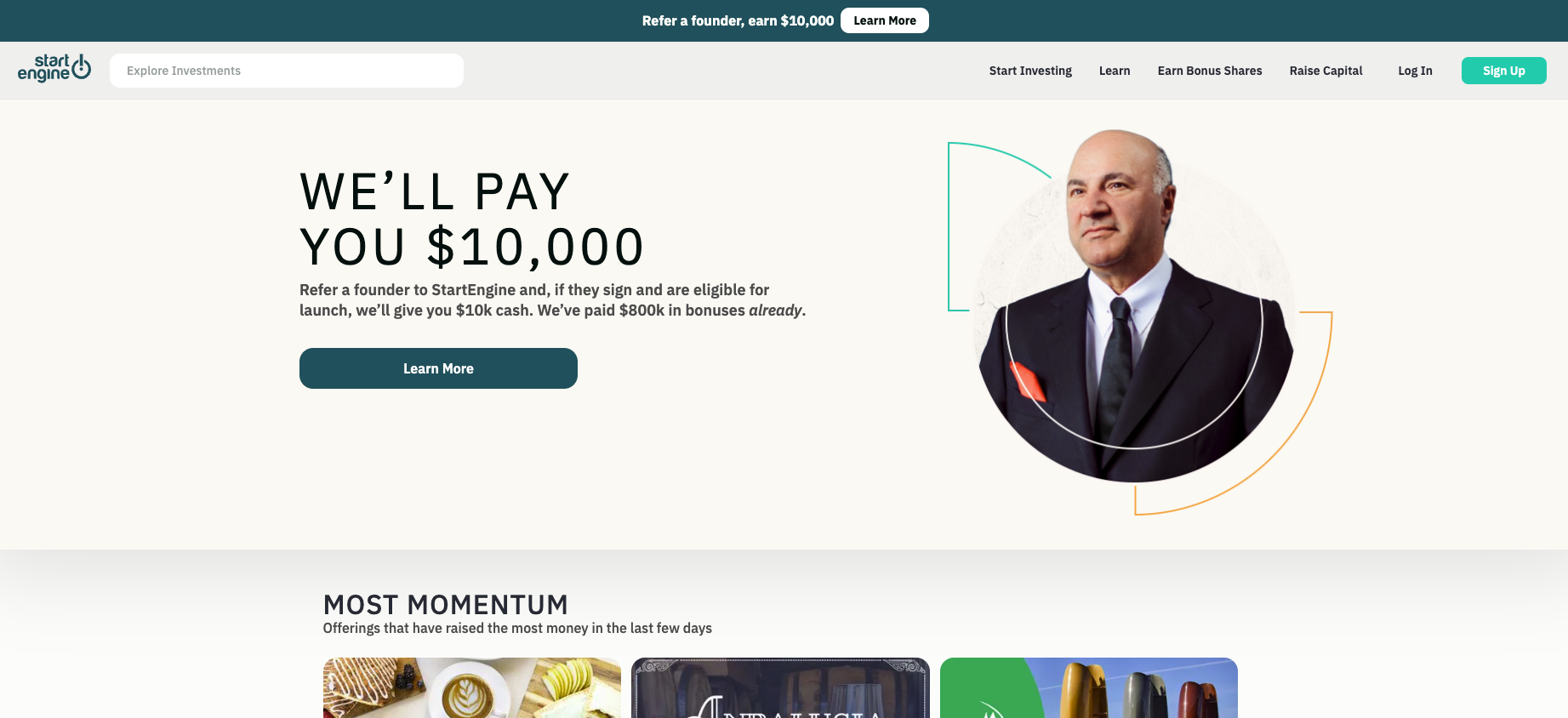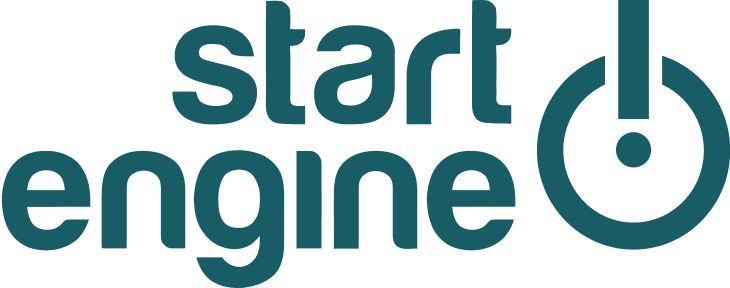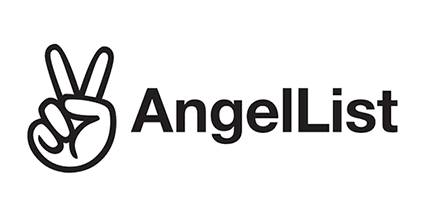
StartEngine is an investment platform that allows you to invest in early-stage startups.
If you’re an extremely lucky investor, you may have held a ten-bagger publicly-traded stock (one that increases by 10X the purchase price) a few times in your life. But publicly-traded stocks rarely see rapid price increases. You can certainly build passive income from stock market investing, but few get wealthy overnight by buying stocks.
But if you dabble in venture capital investing, seeing companies increase their value by more than 1000 percent is a more regular occurrence. Stories of getting in on the ground floor of Airbnb, Uber, and other household names can make even the most conservative investors long for an opportunity to get involved in startup investing. Companies like StartEngine are making that dream a reality, even for Main Street investors.
In this article, we review StartEngine's offering to everyday investors who are interested in startup investing. If you want to raise money for your startup company, StartEngine could be an amazing funding platform for you, but we’re not focusing on the founder experience here.
Quick Summary
- Investment platform with over $1.1 billion in funds committed to early-stage startups.
- Available to accredited and non-accredited investors.
- Typically no investment fees for buying shares of a new investment.
- Trade shares of early-stage funded companies for increased liquidity.
StartEngine Details | |
|---|---|
Product Name | StartEngine |
Services Offered | Crowdfunded Startup Investing |
Minimum Investment | Varies, can be less than $500 |
Investor Fees | $0-3.5% |
Promotions | None |
What Is StartEngine?
StartEngine is an online marketplace seeking to democratize startup investing. Today, most startup investing is done through Venture Capital funding or personal relationships. StartEngine is using newly created crowdfunding rules to bring startup investing to more people.
StartEngine already has 1.7 million investors on its platform, and after acquiring SeedInvest in late 2021, it has more than $1.1 billion in funding committed to startup companies. StartEngine actually used its own platform to raise money for itself. So far, it has raised over $80 million from more than 40,000 investors.
The company helps startups raise Seed funding (up to $5 million), Series A funding (up to $50 million in funding), and Series B funding (up to $75 million in funding).

What Does It Offer?
StartEngine is one of the largest equity crowdfunding websites allowing everyday investors to invest in promising startups. On top of listing high-potential startup companies, StartEngine offers a secondary trading market for investors who wish to liquidate shares in a company.
Buy Shares of Early-Stage Startups
Investors who have an interest in early-stage investing can find plenty of interesting companies to fund on StartEngine. Currently, the platform has 67 open investments with options ranging from new food and alcohol brands, baby equipment rental companies, AI-enabled security robots, and much more.
Both accredited and non-accredited investors can invest in startups on the site, but there are limits to the amount a non-accredited investor can invest.
StartEngine Tracks Your Investment Limits
As a non-accredited investor, you may be limited to investing 10% of your income or 10% of your net worth under a certain set of rules. The limit falls to 5% of income or net worth under other rules. This limit is imposed on a 12-month basis. Keeping track of all of your investments can be a challenge. Thankfully, StartEngine tracks your investments and stops you from investing beyond the legal limits for each year.
Most Fees Paid by Companies, Not Investors
StartEngine is designed to be an investor-friendly platform. The companies raising money will pay fees to StartEngine, but investors don’t pay additional fees in most cases. A company may choose to “share a fee” with investors in which case, a 3.5% transaction fee will be added to each investment. However, that is a one-time fee, and there are no ongoing management fees.
Secondary Trading Market Available
The startup market is notoriously illiquid, and selling shares in startups is nearly impossible in most cases. StartEngine is working to change that by allowing investors to sell shares in a secondary market on the StartEngine platform. Sellers in the market must pay a 5% transaction fee, but buyers can pick up additional shares without paying more.
While a secondary market is a valuable asset for investors, investors should note that startups are notoriously volatile, and they have a high failure rate relative to more stable companies. The presence of a secondary market is no guarantee that you will be able to liquidate your shares.
Low Investment Minimums
Investment minimums vary by investment. For example, at the time of writing, the lowest minimum investment on the platform was only $40. That said, many companies have a $500 investment limit. The low minimums allow investors to diversify across many different startups instead of being stuck with shares of a single startup.
Are There Any Fees?
StartEngine doesn’t charge portfolio management fees to investors, and it typically does not charge investors to buy shares of a company. Some companies choose to pass on StartEngine’s fees to investors. In those deals, a 3.5% transaction fee is added to the funding cost. This is a one-time fee.
In the secondary market, sellers pay a 5% transaction fee, but buyers can pick up shares without paying more.
How Does StartEngine Compare?
With its acquisition of SeedInvest, StartEngine is now the largest equity crowdfunding site. The company offers a broad range of investment opportunities relative to other “crowd” focused sites. That said, AngelList Ventures (which is only open to accredited investors) is a larger site, and it offers easier diversification options through its startup fund concept.
Other sites like Fundable, Republic, and WeFunder have a focus similar to StartEngine’s. Like StartEngine these companies have low investment minimums, minimal investor fees, and are open to accredited and non-accredited investors. StartEngine has more offerings today than each of the three competitors. Additionally, it raised more money in 2021 and 2022 than Republic and WeFunder which indicates it may be a more robust marketplace.
That said, anyone who is interested in startup investing should consider using multiple platforms. The market for startup shares isn’t like the New York Stock Exchange where the whole world is trading at once. You will need to hunt across multiple marketplaces to find the startups that make sense for your investment strategy.
Header |  |  |  |
|---|---|---|---|
Rating | |||
Min. Investment | Varies, but can be less than $500 | Varies, but can be as low as $1000 | $10 |
Fees for Investors | $0-3.5% | $1-2% | $0 |
Fees for Start-Up Companies | 3.5%-5% | 0.75% of fund size | 6% of total cash raised + 2% as a Crowd Safe |
Open to Non-Accredited Investors? | Yes | No | Yes |
Cell |
How Do I Open An Account?
To open an account on StartEngine, you can connect using Apple, Google, or Facebook, or provide an email address and a password. All users must also submit their legal first and last names to get started.
If you select an investment that’s of interest to you, you will need to provide additional details including your address, phone number, and tax ID or Social Security Number. If StartEngine can’t verify your personal details, you may also need to provide a photo ID. To avoid running afoul of crowdfunding rules, you also have to fill out an investor profile that includes your income, net worth, and other financial details. These are used to limit the amount you can invest in a 12-month period.
Once you’ve been verified, you can fund investments by transferring money from a bank account, paying directly with a credit card, or using a wire transfer to fund a deal.
Is It Safe And Secure?
StartEngine is registered as a broker-dealer with the SEC, and it seeks to comply with all Federal and State laws around identity security, privacy protection, etc. To comply with various Federal investment and anti-money laundering laws, StartEngine must collect identifiable information (such as name, address, ID Numbers, and more) from investors on the platform. It also collects bank account or credit card information for those at choose to invest through StartEngine.
StartEngine uses appropriate digital controls including encryption, secure transfer protocols, and other technical and business controls to reduce the risk of identity theft. StartEngine only shares personal information with third parties that are enlisted to provide services on behalf of StartEngine (such as processing payments or digital document signing).
Overall, the StartEngine platform appears to be safe for consumers. However, the safety of the platform doesn’t mean that StartEngine is a “safe investment platform.” The company offers shares in startups. All investments may lose money, including “safe” investments like bonds. However, startups are known for being incredibly volatile. It is likely that at least some of the investments you buy through StartEngine will go to $0 in value over time. Others may produce no return, and they may not ever have an “exit” opportunity where investors can see a return on their capital investment.
If you choose to invest through StartEngine, you must understand that this is a long-run investment that is very high risk. You don’t want to put your “safe” money into this type of investment.
How Do I Contact StartEngine?
StartEngine’s headquarters is located at 3900 W Alameda Ave Suite 1200, Burbank, CA 91505. To contact customer service, you can use the investor support contact form that is hosted on the StartEngine website. The StartEngine App also has a chat feature which is staffed from 9 AM - 5 PM Pacific Time.
Who Is This For And Is It Worth It?
If you’re looking to diversify into alternative investments, buying shares in a few startups through StartEngine may make sense for you. This is a platform for making small “bets” on a few companies to see if any of the companies can help your money grow 10x, 20x, or even 100x the original investment.
The platform is secure, it offers very detailed information about the companies seeking funding. Even as a crowdfunder, you get treated like a venture capitalist. As a startup investor, you should look at StartEngine and its competitors to find the best investment options for you.
And remember, startup investing should not replace common sense personal finance basics like investing for retirement and paying off debt.
StartEngine Features
Account Types | Crowdfunded startup investing |
Minimum Investment | Varies, can be lower than $500 |
Investor Fees | $0, but some startups charge a 3.5% transaction fee |
Startup Fees | 3.5%-5% |
Investor Requirements | Accredited or non-accredited |
Risk Level | High |
Customer Service Options |
|
Customer Service Hours | 9AM - 5PM PST (online chat) |
Secondary Market | Yes |
Web/Desktop Account Access | Yes |
Mobile App Availability | iOS only |
Promotions | None |
StartEngine Review
-
Pricing and Fees
-
Ease of Use
-
Customer Service
-
Diversification
-
Liquidity
Overall
Summary
StartEngine is a crowdfunding investment platform specializing in startup companies. It offers low investment minimums, a secondary market, and is open to accredited and non-accredited investors.
Pros
- Largest crowdfunding equity site open to non-accredited investors.
- A secondary market is available for buying and selling startup shares.
- Investors pay very few fees in most cases.
- Investment minimums are as low as $500 per investment.
Cons
- Startup investing is inherently risky, and the platform has a limited amount of companies where investors can currently invest.
- Even with a secondary market, startup shares may be difficult to liquidate.
- A disproportionate share of investment opportunities are in the tech or food and alcohol industries.

Hannah is a wife, mom, and described personal finance geek. She excels with spreadsheets (and puns)! She regularly explores in-depth financial topics and enjoys looking at the latest tools and trends with money.
Editor: Colin Graves Reviewed by: Robert Farrington